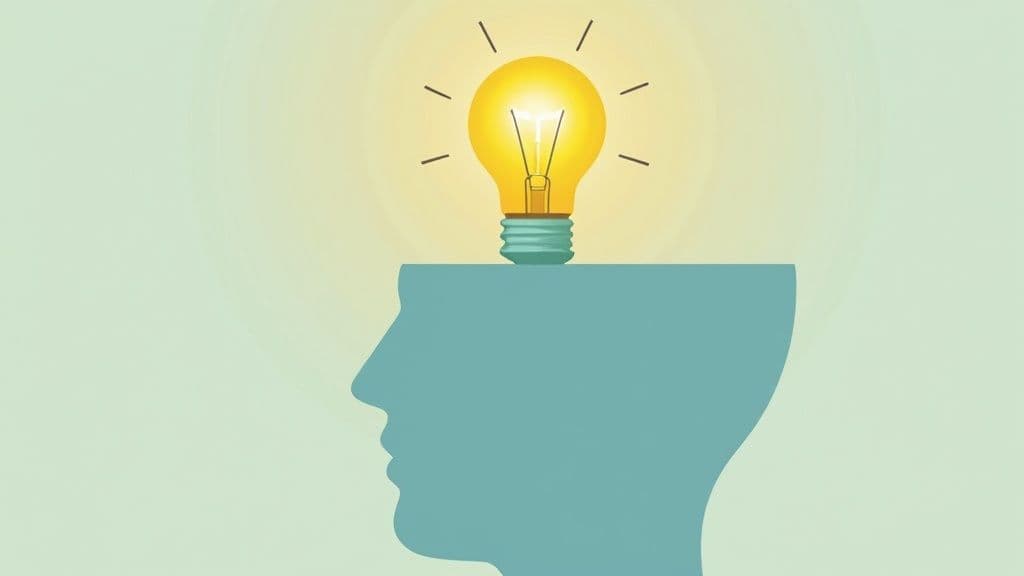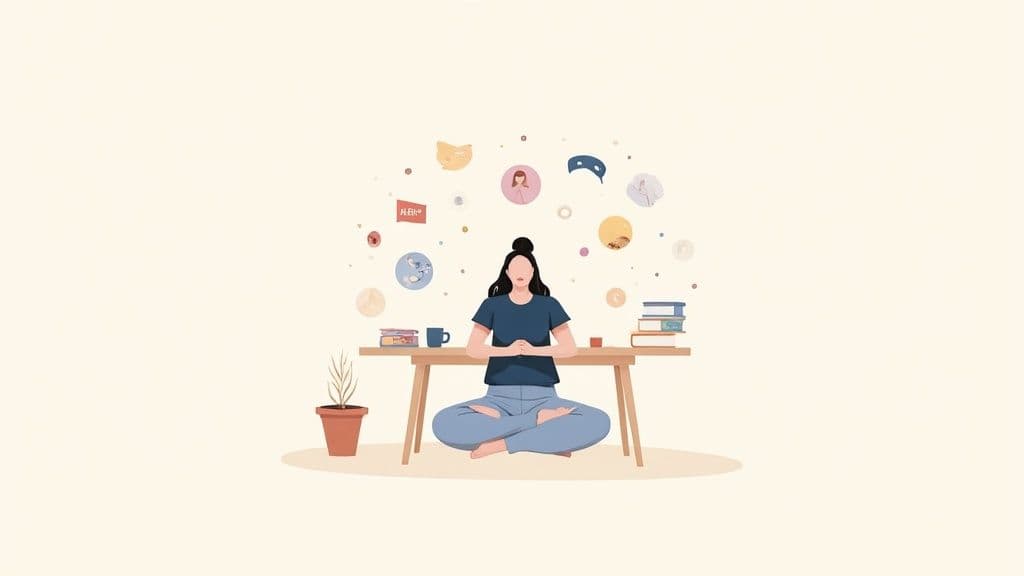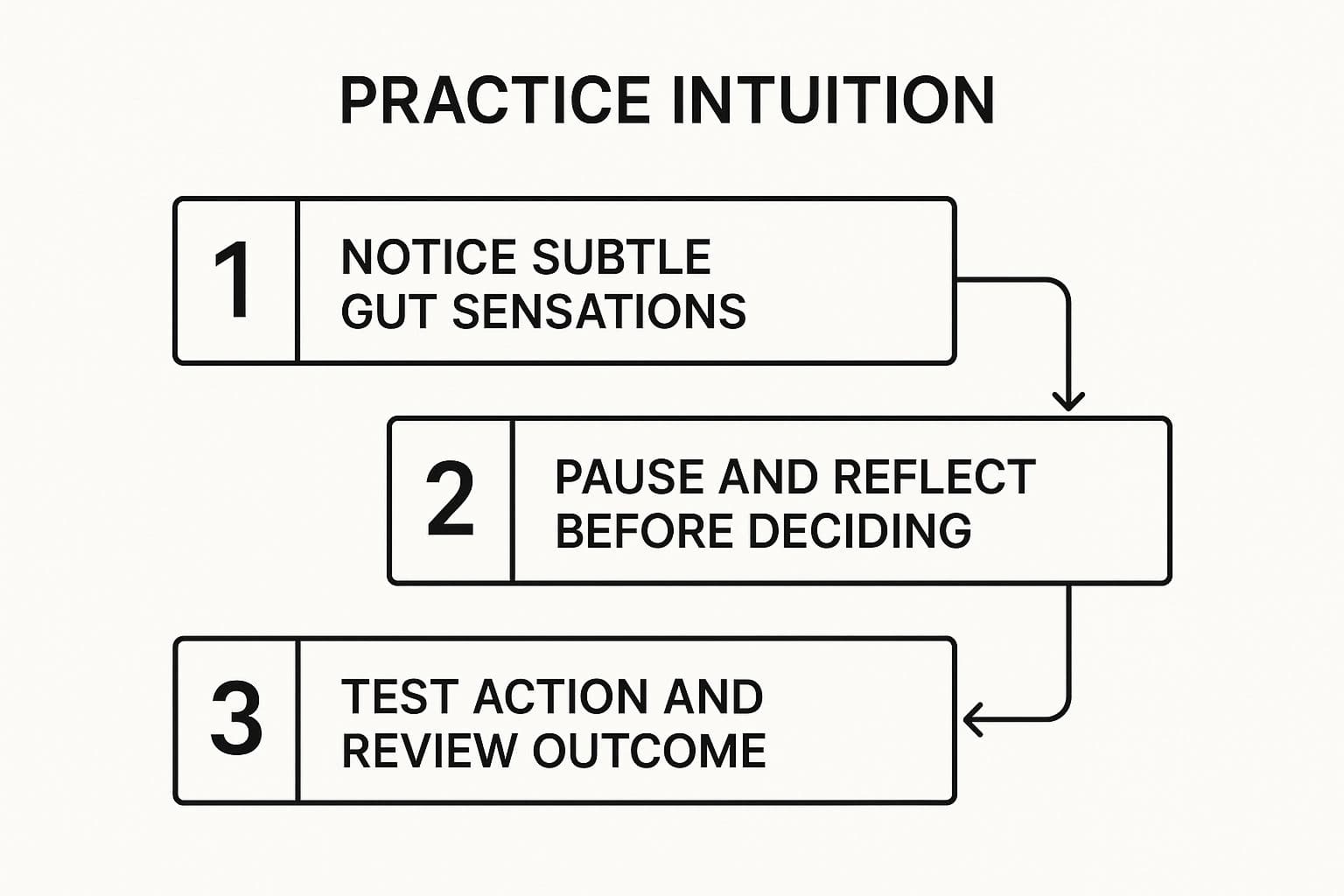Learning to trust your intuition isn’t a mystical gift—it’s a practical skill you can build. With short daily habits that reduce stress, tune body signals, and create measurable feedback, you can make clearer, more confident decisions.
July 16, 2025 (7mo ago) — last updated February 26, 2026 (4d ago)
Sharpen Your Intuition: Trust Your Gut
Science-backed habits—mindfulness, body awareness, journaling, and low-stakes practice—to sharpen intuition and make clearer decisions.
← Back to blog
Sharpen Your Intuition: Trust Your Gut
Summary: Science-backed habits—mindfulness, body awareness, journaling, and low-stakes practice—to sharpen intuition and make clearer, more confident decisions.
Introduction
Learning to trust your intuition isn’t a mystical gift reserved for a few. It’s a practical skill you can develop with short, consistent habits that lower stress, tune body signals, and create measurable feedback. This guide gives clear, evidence-informed steps—mindfulness, somatic checks, reflective journaling, and low-stakes practice—to help you cut through mental clutter and make clearer, more confident decisions.

How to Improve Your Intuition
Sharpening intuition is a learnable skill, like practicing an instrument or strengthening a muscle. The work is mostly about reducing mental noise and noticing quieter, wiser signals. Your intuition often arrives as a gut feeling, a flash of insight, or a calm sense of knowing. Modern life nudges us toward cold data and constant stimulation, so restoring balance requires practices that lower stress, increase body awareness, and create feedback loops that test hunches over time. Early research on heuristics and judgment reframed how we understand intuition and bias1.
Move Past Cognitive Biases
We all rely on mental shortcuts, or heuristics, which can skew judgment. To develop reliable intuition, learn to notice those habits and gently counteract them. Core practices that work together are:
- Mindfulness and meditation to reduce mental noise and increase clarity.
- Somatic awareness to read physical signals—tightness, warmth, ease—as meaningful data.
- Reflective journaling to record hunches and outcomes, building trust through evidence.
These practices don’t replace logic. The goal is alignment: when head and gut agree, decisions feel clearer and more authentic.
A Practical Path to Building Inner Trust
Treat this like getting to know a person—your deeper self. With patience and curiosity you’ll learn to pause and ask, “What is this feeling trying to tell me?” Below are tangible exercises to help you separate genuine intuitive hits from fear-based reactions. Combining mindfulness, body awareness, and structured reflection helps you form a reliable inner compass.
Core Practices for Developing Intuition
| Practice | Primary Benefit | How It Works |
|---|---|---|
| Mindfulness & Meditation | Mental clarity | Reduces mental noise so subtle signals can surface and be noticed. |
| Somatic Awareness | Body intelligence | Teaches you to interpret physical sensations as data. |
| Reflective Journaling | Builds trust | Logs hunches and outcomes so you can measure accuracy over time. |
| Numerology (via The Life Purpose App) | Symbolic insight | Offers a symbolic framework to interpret recurring themes and timing. |
| Real-World Exercises | Practical application | Tests small hunches in low-stakes situations to build confidence. |
Each practice reinforces the others: meditation clears space to notice the body, and journaling turns impressions into verifiable patterns.
Create Mental Space with Mindfulness
Intuition is a quiet voice. To hear it, you must lower the volume on daily stress and constant notifications. Mindfulness isn’t about emptying your mind; it’s about creating enough space to notice what’s already there. Short, consistent practice reduces stress and increases present-moment awareness, with randomized trials and meta-analyses showing measurable benefits for anxiety and well-being2.
Simple Breathing Exercise
Try this three-minute reset:
- Find a quiet spot and sit comfortably with a straight back.
- Close your eyes and breathe in through your nose for a count of four, hold briefly, then exhale slowly through your mouth.
- Focus on the sensation of the breath. When your mind wanders, gently bring it back without judgment.
A few minutes a day trains your ability to return to the present moment. That basic skill makes it easier to tell the difference between a passing anxious thought and a real intuitive nudge.
Apply Mindfulness in Daily Life
Before a difficult conversation, try a short breathing reset. Calming your nervous system opens the door for a wiser response, perhaps a more empathetic opening line or a clearer sense of what you truly want to say. Body-scan meditation is another useful technique: lie down, close your eyes, and move attention slowly from your toes to your head, noticing sensations without judgment. This strengthens the mind–body connection that underpins intuitive awareness.
Internal link: For a short starter routine, see /mindfulness-basics.
Listen to Your Body’s Innate Wisdom
Intuition often arrives as a bodily sensation. Phrases like “gut feeling” reflect how our bodies signal us. These physical cues, called somatic markers, are part of the body’s language for guiding decisions and emotions3.

To strengthen intuition, rebuild the conversation between mind and body. Start with small check-ins: before judging someone or making a choice, pause and notice how your body reacts. A sense of ease often points toward alignment, while tightness or constriction can signal misalignment.
Tuning Into Somatic Markers
Try these simple practices:
- The Doorway Check-In: Use passing through a doorway as a trigger to notice your emotional and physical state for a second.
- The Decision Scan: Picture Option A, scan your body for sensations, then do the same for Option B. Often one option will feel lighter or more settled.
Physical health affects clarity too. Research on the gut–brain connection shows how much our physical state influences mental signals and decision-making4.
Internal link: Read more about body-awareness exercises at /body-awareness-exercises.
Use Reflective Journaling to Find Patterns
Mindfulness and somatic awareness help you notice intuition. Journaling is how you prove it. Recording hunches and outcomes creates a feedback loop that builds trust over time. This systematic approach turns vague feelings into measurable insights.
How to Journal for Intuition
Use a dedicated notebook and make entries whenever you notice a meaningful hunch or choice. Try these prompts:
- “What was my very first, unfiltered feeling about this person or situation?”
- “What specific physical sensations did I notice?”
- “Which subtle red flags or green flags did I initially ignore?”
- “Did my intuition clash with logic? If so, how?”
- “What was the final outcome, and how did it line up with my initial feeling?”
Track entries in a simple log so you can spot trends. Over time you’ll collect clear evidence of when your intuition is reliable and when fear or wishful thinking misled you.

Tracking Your Intuitive Accuracy
| Date | Situation/Decision | Initial Gut Feeling | Action Taken | Outcome & Reflection |
|---|---|---|---|---|
Consistent logging makes patterns obvious. After a few clear matches between gut feeling and outcome, you’ll naturally start to trust your inner guidance more.
Internal link: For journaling templates, see /journaling-tips.
Give Your Intuition a Framework with Numerology
If symbolic frameworks help you reflect, numerology can add structure. It doesn’t predict the future. Instead, it offers archetypal language to help you interpret recurring themes and timing. Using a Life Path number as a lens can sharpen questions you ask during meditation or journaling. Tools like The Life Purpose App provide prompts to explore these themes.
Research suggests that intuitive problem-solving improves with experience and that giving intuition a structure helps it mature into a reliable skill6.
Practical Example
If you’re choosing between a safe job and a risky venture that excites you, and your Life Path theme emphasizes freedom and change, that framework can validate the pull toward the new path. It won’t make the choice for you, but it provides a useful lens for reflection.
Common Questions About Building Intuition
What if my intuition and logic disagree?
Pause and gather more information. Conflicting signals are an invitation to dig deeper. Use the tension to ask clarifying questions, scan your body for how each option feels, and journal to see which signal proves reliable over time.
How can I tell intuition from fear?
Intuition often feels neutral and steady, like a calm knowing. Fear tends to be loud, repetitive, and story-driven, accompanied by tightness, racing heart, or shallow breathing. A quick body scan can help you tell the difference.
How long does it take to see results?
You can notice small shifts in weeks with consistent practice. Deeper trust develops over months and is strengthened by reflective journaling that documents outcomes.
Ready to discover the unique intuitive framework your life is built upon? The Life Purpose App provides instant access to your personal numerology, helping you understand your core gifts, challenges, and the life path you were born to live. Download it at https://lifepurposeapp.com.
Quick Q&A — Fast Answers
Q: What’s the fastest way to start trusting my gut?
A: Do a daily three-minute breathing reset, add a weekly body-scan, and log every meaningful hunch with outcome notes.
Q: How do I avoid confusing fear with intuition?
A: Do a short body scan. Fear usually produces tightness and rapid thoughts; intuition feels steadier and neutral.
Q: How do I build evidence that my intuition can be trusted?
A: Keep a structured intuition log. Record the initial feeling, physical sensations, the action you took, and the outcome. Patterns will emerge.
Discover Your Life Purpose Today!
Unlock your true potential and find your life’s purpose.
